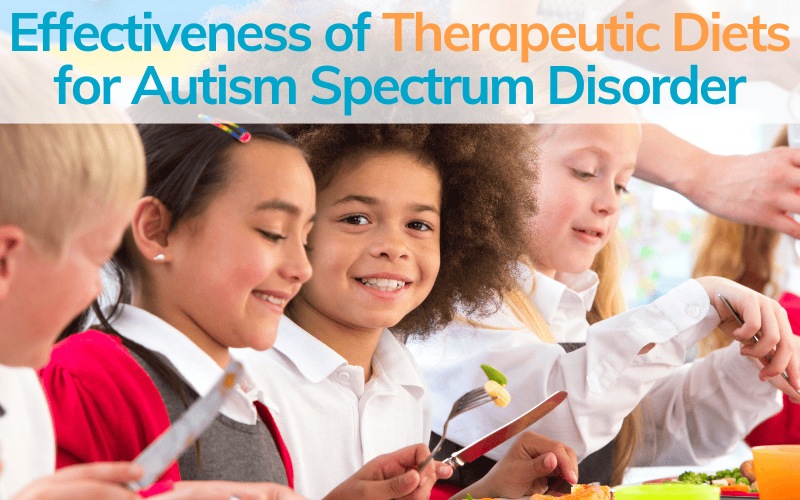
I’m excited to share the results of our nutrition research, Ratings of the Effectiveness of 13 Therapeutic Diets for Autism Spectrum Disorder, published in the Journal of Personalized Medicine. In this paper, James Adams, PhD, and I (Julie Matthews, MS) explored the efficacy of therapeutic diets and their effects at improving the symptoms of Autism Spectrum Disorder (ASD).
Autism rates continue to rise globally, millions of children (and adults) are affected. With few medical and pharmaceutical interventions available, there is a strong need for effective strategies that enhance quality of life and minimize adverse effects.
Purpose of the Study
The objective of our study was to rate the effectiveness of therapeutic diets for providing overall benefit and improving symptoms in children and adults with ASD. We also aimed to understand whether different diets had different beneficial results on symptom improvements.
The survey we used to study therapeutic diets was also used to rate psychiatric and seizure medications, nutritional supplements (aka “nutraceuticals”), and therapies. Because of this shared rating scale, these different interventions could be compared to each other.
Methods
This was an observational study using a survey created for caregivers of and individuals with ASD. 818 participants responded to the diet survey including children and adults, ranging from under 3 years old to over 60. Diets that had 20 or more responses were included in the study.
The diets included were:
- Healthy Diet
- Low Sugar Diet
- Feingold Diet
- GFCF Diet
- Corn-free Diet
- Casein-Free Diet
- Soy-Free Diet
- Gluten-free Diet
- Food Avoidance, IgG/IgE
- Food Avoidance, observation
- Specific Carbohydrate Diet
- Paleo Diet
- Ketogenic Diet
Results
Frequency
In our survey, we looked at how frequently the diets were used. The topmost used diet was a gluten-free and casein-free (GFCF) diet. Second, was a healthy diet. Third was a casein-free diet by itself and fourth was a gluten-free diet by itself.
The GFCF diet is a popular diet among autism families and as we will see, provides good benefit and symptom improvement. Additionally, some of the diets that were not as commonly used, were highly rated and had high symptom improvements. For example, while the Feingold diet was only used by 74 people compared to 221 on the GFCF diet, the Feingold diet was the second highest rated diet with no adverse effects reported and was rated number one for six symptom improvements. So it’s advantageous to look not only at the diets used by the most families, but to also look at diets based on what symptoms that an individual would like to address.
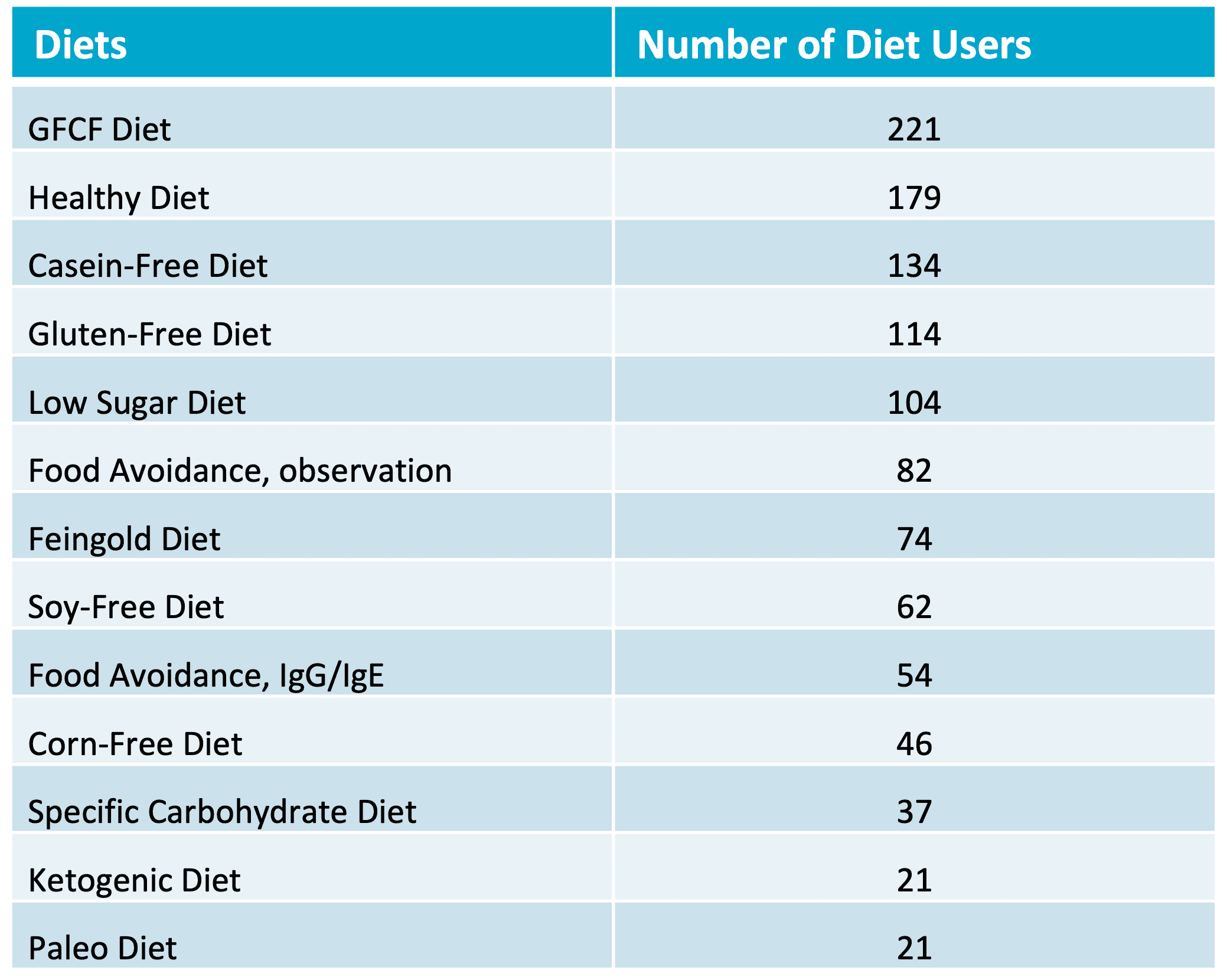
Overall Benefit
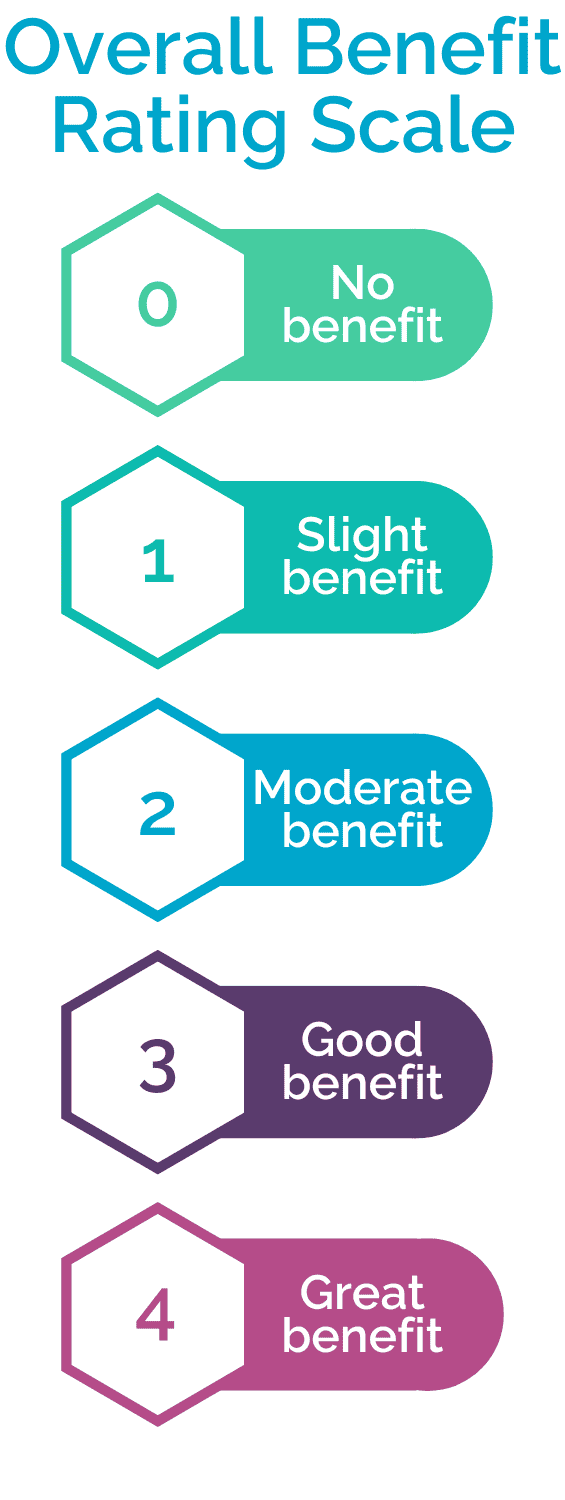 We found that therapeutic diets had an average overall benefit rating of 2.36 out of 4.0 (on a scale of zero=no benefit and 4=great benefit). Compared to psychiatric and seizure medications, which had a rating of 1.39, therapeutic diets had a significantly higher overall benefit. The therapeutic diets also had a significantly lower adverse effects score (0.1) than psychiatric and seizure medications, (0.93). Therapeutic diets also had a significantly higher overall benefit than nutraceuticals, but a similarly low adverse effects score.
We found that therapeutic diets had an average overall benefit rating of 2.36 out of 4.0 (on a scale of zero=no benefit and 4=great benefit). Compared to psychiatric and seizure medications, which had a rating of 1.39, therapeutic diets had a significantly higher overall benefit. The therapeutic diets also had a significantly lower adverse effects score (0.1) than psychiatric and seizure medications, (0.93). Therapeutic diets also had a significantly higher overall benefit than nutraceuticals, but a similarly low adverse effects score.
If we look at overall benefit from therapeutic diets, we can see that while they all did quite well, some were rated more highly than others. In the chart that is included here you can see that some diets like a healthy diet, or Feingold diet, were very highly rated with no adverse effects. A food avoidance based on IgG and IgE testing also ranked high with no adverse effects. Other diets were also highly rated with slightly higher adverse effects, but still did quite well.
Additionally, autism severity decreased in individuals who used therapeutic diets compared to increasing in those that did not do dietary intervention.
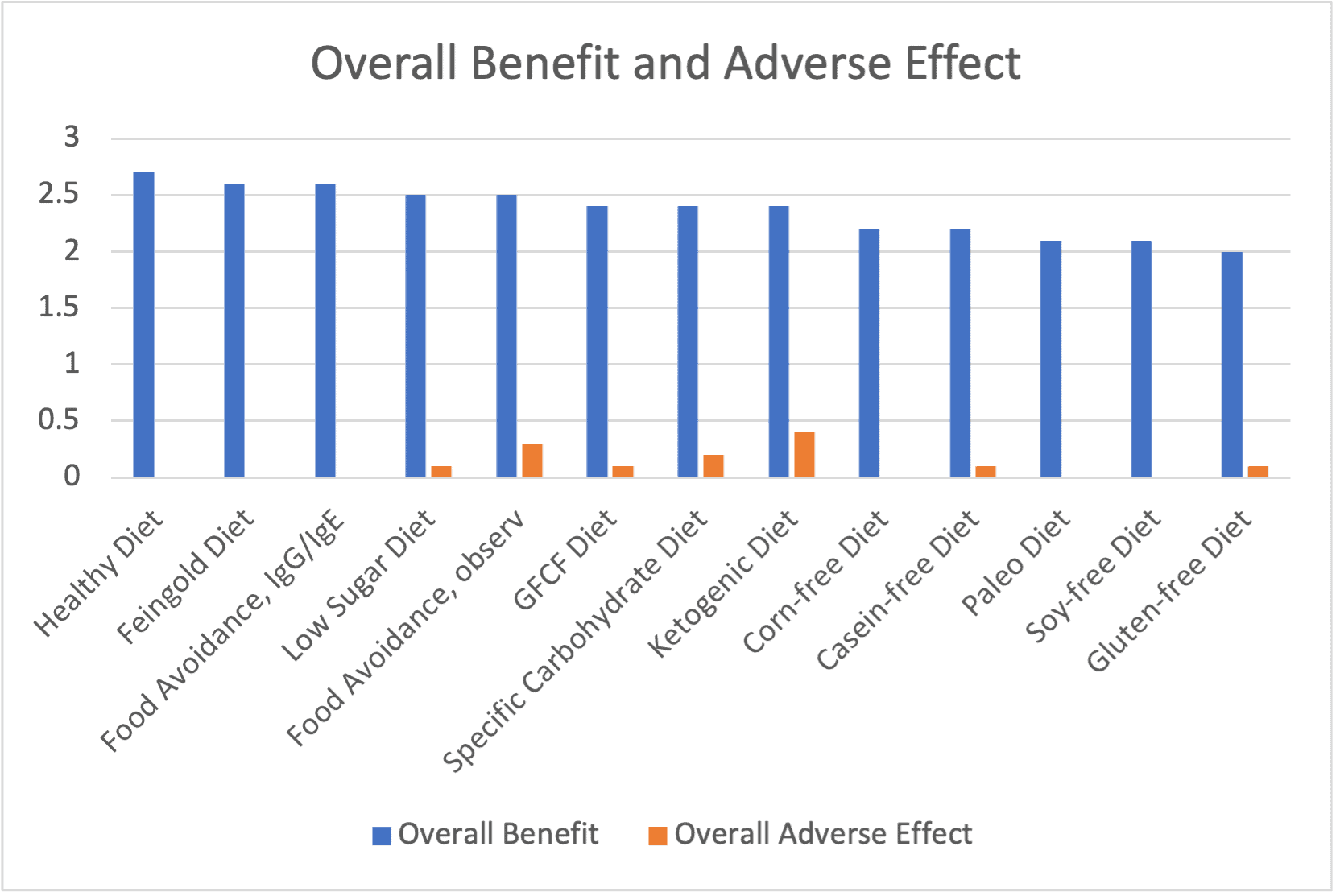
Matthews JS, Adams JB. Ratings of the Effectiveness of 13 Therapeutic Diets for Autism Spectrum Disorder: Results of a National Survey. JPM. 2023;13(10):1448. doi:10.3390/jpm13101448
Diets improve Autism and Related Symptoms
When we look at the top symptom improvements across all diets, we see the top-rated symptom improvements were: attention, cognition, irritability, health, hyperactivity, aggression/agitation, anxiety, constipation, diarrhea and language/communication with 15% or more of individuals improving.
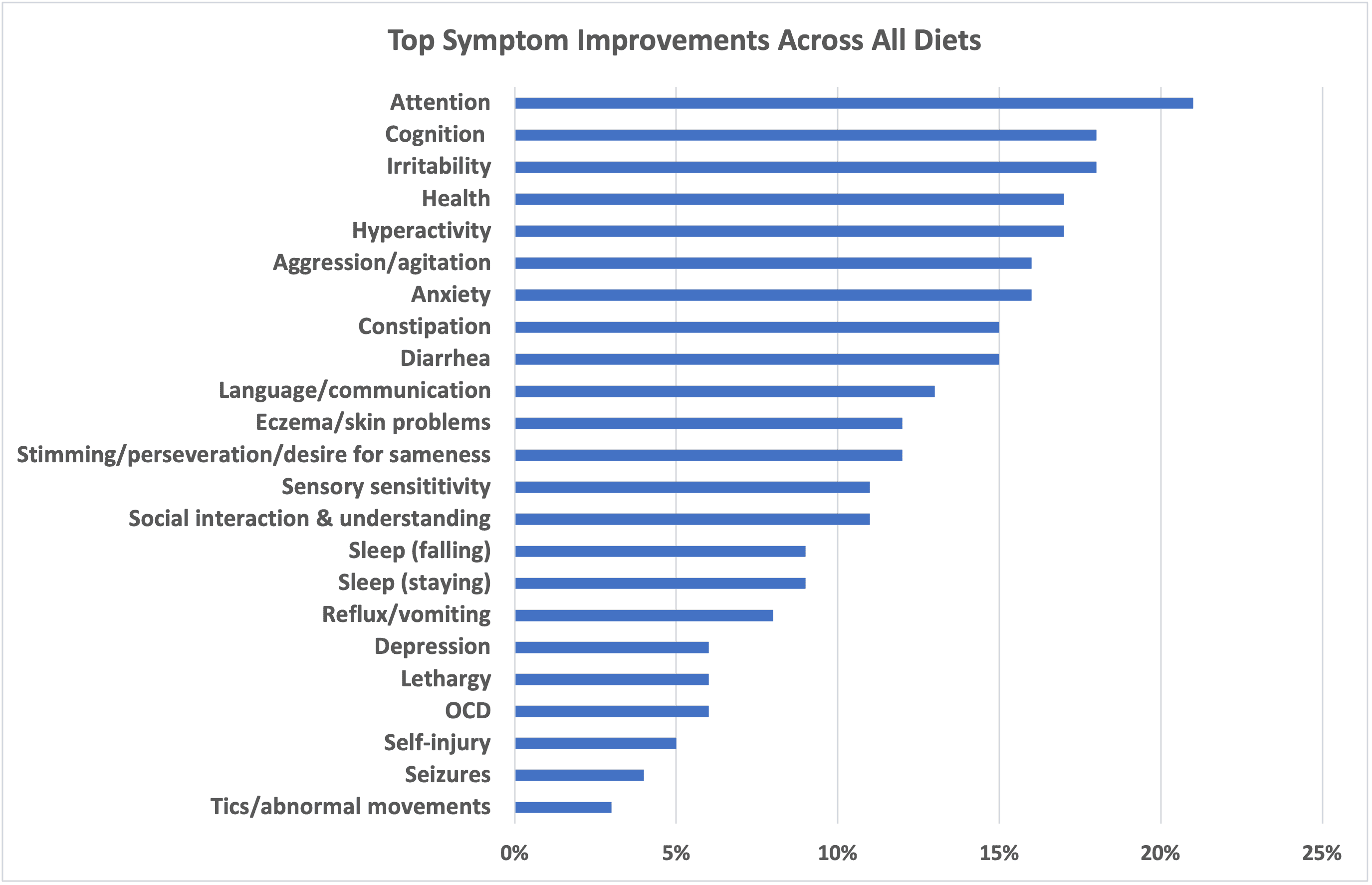
Matthews JS, Adams JB. Ratings of the Effectiveness of 13 Therapeutic Diets for Autism Spectrum Disorder: Results of a National Survey. JPM. 2023;13(10):1448. doi:10.3390/jpm13101448
Specific Diets and Their Effectiveness
Now, we will explore specific diets and the symptoms they most effectively improve.
With the Feingold diet, a diet free of artificial additives and low in salicylates, 45% of individuals who had hyperactivity had improvement, 38% improved in irritability, 37% in attention. 34% in aggression/agitation, and 28% in anxiety as well as cognition. And this is also what we see in practice. Dr. Ben Feingold, a pediatrician and founder of the diet, discovered similar improvements while working with children when he developed and used this diet in the 1970s. I have seen the same improvements in children with autism in my practice.
The gluten-free casein-free diet had a lot of improvements as well. Thirty-one percent of individuals improved attention, 29% improved cognition, 25% improved language and communication, 22% and improved diarrhea, as well as hyperactivity, social interaction and understanding and more.
The ketogenic diet was another diet that provided many improvements in symptoms such as 43% of individuals improved in attention, 38% in cognition, 33% improved anxiety, 29% improved irritability, 29% also improved language/communication, and in social interactions and understanding. Constipation was also another key symptom along with lethargy, sleep, and seizures. The ketogenic diet was the top diet for seizures, which isn’t surprising considering it has been studied for decades for its use in helping with seizures.
A few other highlights from our survey showed that a healthy diet was the top rated diet for improving health. And well, I suppose that seems to make sense. I think parents will find it encouraging to see that the more we focus on a healthy diet, the more it can support our children’s overall health, and other symptoms as well.
A corn-free diet was very beneficial for improving diarrhea and constipation. A low sugar diet was one of the top diets for hyperactivity, aggression, and irritability.
The Paleo Diet was the top diet for tics, self injury, and OCD, although these were less common symptoms overall. And the Specific Carbohydrate Diet was one of the top diets for anxiety, social interaction and understanding, as well as stimming. The Food Avoidance Diet, Based on IgG/IgE Testing was ranked high for eczema/skin problems and reflux/vomiting. The Food Avoidance Diet, Based on Observation was one of the top 5 diets for 15 symptoms including health, irritability, eczema/skin problem, aggression/agitation, diarrhea, cognition, and hyperactivity. Soy-Free was beneficial for improving symptoms such as diarrhea, aggression/agitation, and irritability.
The GFCF diet outperformed the individual gluten-free diet or casein-free diet.
There are many more symptom improvements described in the study. In fact, there are 24 symptom improvements:
- Aggression/Agitation
- Anxiety
- Attention
- Cognition (ability to think)
- Constipation
- Depression
- Diarrhea
- Eczema/Skin problem
- General benefit, no one particular symptom
- Health (fewer illnesses and/or less severe illnesses)
- Hyperactivity
- Irritability
- Language/Communication
- Lethargy (easily tired)
- OCD
- Reflux/Vomiting
- Seizures
- Self-Injury
- Sleep (falling asleep)
- Sleep (staying asleep)
- Social Interaction and Understanding
- Stimming/Perseveration /Desire for Sameness
- Tics/Abnormal movements
You can read the full study for all of the details on which diets provided the best improvement in symptoms.
Interpretation of Results and Personalized Nutrition
There are many underlying factors that affect children with autism including poor digestive health, microbiome imbalance, mitochondrial dysfunction, immune system dysregulation, and more. Therapeutic diets aim to address these underlying factors to improve them, thereby enhancing the functioning of the body and brain, improving symptoms. Different therapeutic diets address different underlying conditions that are affecting individuals, which is one of the reasons that certain diets are better for certain people.
When we compare the overall benefit from diet versus symptom improvements, some diets were rated higher in overall benefits, other diets were rated higher in symptom improvements. However, since all diets ranged from moderate to good benefit, using this to make a determination on which diet to use is not as helpful as using symptom improvements.
Since we found that different therapeutic diets improve different symptoms, we concluded that symptoms may be a useful way to guide dietary approach, and that a personalized approach to diet and nutrition is best.
I also recommend that my Nourishing Hope families consider the complexity of the diet and the restrictions associated with the diet because that may influence which diet they choose. Some diets, such as the ketogenic diet, showed wonderful improvements; however, the diet greatly restricts carbohydrates, making it a more difficult diet to do and possibly contributing to nutrient deficiencies if not done properly and with professional guidance.
Conclusion
All in all, we found that therapeutic diets were beneficial and improved symptoms in children and adults with autism, and that a personalized approach is best.
From the study, we found that therapeutic diets should both: include healthy foods and exclude problematic foods. Therapeutic diets are generally safe and effective for individuals with ASD. They are relatively inexpensive. And it’s always important to seek support from a qualified nutrition professional.
We encourage parents, healthcare professionals, and researchers to consider dietary interventions as a significant component of caring for an individual with ASD.




0 Comments